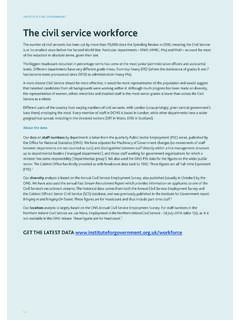Transcription of Understanding the economic impact of Brexit
1 Understanding the economic impact of BrexitGemma Tetlow | Alex StojanovicOctober 2018 About this reportThe UK s exit from the EU marks a step-change in the country s economic relationship with the bloc. The UK will be moving away from close integration and co-operation with its nearest neighbours, while potentially reopening the opportunity to negotiate trade deals directly with non-EU countries. Many analyses have tried to estimate what effect Brexit is likely to have on the UK economy. These economic considerations are one of the questions that will weigh on MPs minds when they come to scrutinise and vote on the Government s withdrawal agreement later this year. Prime Minister Theresa May has said her government will publish its assessment of the likely economic impact of the proposed Brexit deal with the EU, which should help MPs decide how to cast their meaningful vote on the agreement.
2 Most studies published to date conclude that Brexit will reduce economic growth although the scale of the predicted reduction varies widely. This report attempts to make clear the assumptions that different studies have made, what evidence they have to support them, and why this leads to such diverse conclusions about the possible economic consequences of Brexit for the UK of figures and tables 2 Summary and recommendations 31. Introduction 7 Immediate economic impact of the vote for Brexit 8 Long-term economic impact of Brexit 10 Outline of this report 112. How Brexit might affect the UK economy 12 Trade 12 Foreign direct investment 14 Number and type of workers 15 Regulations 16 Productivity 17 Value of sterling 18 Other policy responses 183.
3 How large is the impact likely to be? 20 Describing the long-term economic impact of Brexit 23 What would happen if the UK stayed in the EU? 24 Ways of modelling the economy 25 Trade costs 27 Investment 41 Domestic regulations 42 Migration 44 Contributions to the EU budget 45 Productivity growth 464. How will the impact vary across the UK? 48 Distributional implications of the Economists for Free Trade model 48 How will Brexit affect different sectors of the economy? 49 How will Brexit affect different regions of the UK? 53 How will Brexit affect people in different income groups? 552 Understanding THE economic impact OF BREXIT5. From here to there: the economic implications of adapting to a new relationship 57 Short-term disruption could be some costs associated with divergence could take time to emerge 58 Conclusion 60 Appendix.
4 Overview of existing studies of the economic impact of Brexit 64 References 67 List of figures and tables Figure 1 Forecast long-term impact of Brexit on GDP, relative to remaining in the EU 4 Figure 2 Forecast long-term impact of Brexit on GDP, relative to remaining in the EU 22 Figure 3 Forecast long-term impact of Brexit on per capita GDP, relative to remaining in the EU 24 Figure 4 Comparison of estimates of non-tariff barriers by sector (% tariff rate equivalent) 33 Table 1 Assumptions about free trade agreements with non-EU countries 31 Table 2 How much would non-tariff barriers to trade change following Brexit ? 38 Table 3 Comparing the estimated impact of Brexit on UK economic output, with and without allowance for an effect on productivity 47 Table 4 Uncertainty around the central projections for the economic impact of Brexit 64 Table 5 Assumptions about changes to foreign direct investment (FDI) post- Brexit 65 Table 6 Assumptions about changes to migration post- Brexit 663 SUMMARY AND RECOMMENDATIONSS ummary and recommendationsThe UK s exit from the EU marks a step-change in the country s economic relationship with the bloc.
5 The UK will be moving away from close integration and co-operation with its nearest neighbours, but potentially reopening the opportunity to negotiate trade deals directly with non-EU considerations are one important part of the Brexit debate, but not the only question that will weigh on MPs minds when they come to scrutinise and vote on the Government s withdrawal agreement and proposed framework for a future relationship with the EU later this Minister Theresa May has said that her government will publish its assessment of the likely economic impact of the proposed Brexit deal with the EU as set out in the political declaration on the future framework, even though the legal binding element on which MPs will be voting is the withdrawal agreement itself.
6 This information should help MPs decide how to cast their meaningful vote on the different organisations have published estimates already of how Brexit might affect the UK economy in the longer term, including two produced by government: one published officially by the Treasury before the referendum, and a preliminary version of some government analysis leaked to the press in January 2018. All of these analyses have tried to provide answers to the question: How much larger or smaller will the UK economy be in future if the UK leaves the EU than it would have been, had the UK remained a member of the bloc? The answers vary hugely, as Figure 1 shows. The vast majority of studies conclude that Brexit will reduce economic growth although the scale of reduction predicted differs.
7 Only one study (by the Economists for Free Trade, EFT) concludes that the UK economy would receive a significant boost from Brexit . Mostly, the differences are not down to hard-to-fathom variation in the complex underlying economic models. Instead, the different answers largely reflect variation in the assumptions fed into those report attempts to make clear the assumptions that different studies have made, what evidence they have to support them, and why this leads them to reach diverse conclusions about the possible economic consequences of Brexit for the UK these long-term projections provide important information about how Brexit will affect the UK economy, they do not provide a full picture of the possible, shorter-term impact of any particular Brexit deal (or lack thereof).
8 In particular, long-term projections for a scenario in which the UK and EU trade with one another on World Trade Organization (WTO) terms are often referred to in the public debate as a no deal scenario. However, the short-term impact of talks breaking down and the UK crashing out of the EU without any form of deal would likely be much more disruptive than these long-term WTO projections suggest. 4 Understanding THE economic impact OF BREXITF igure 1: Forecast long-term impact of Brexit on GDP, relative to remaining in the EURabobankCEP DynamicCPB DynamicTreasuryHMGCPB StaticRandNIESRO xfordPwCCEP StaticCiuriakBertelsmannOEEFT-20%-15%-10 %-5%0%5%10%European economic AreaSwiss bilateralsFree Trade AgreementWorld Trade OrganizationUnilateral Free TradeTrading scenarioSource.
9 Institute for Government analysisCEP Centre for economic Performance, CPB Netherlands Bureau for economic Policy Analysis, EFT Economists for Free Trade, HMG HM Government, NIESR National Institute of economic and Social Research, OE Open Europe, Oxford Oxford EconomicsThe headline estimates of the long-term impact of Brexit could also hide variation across different types of businesses, regions of the country, or richer and poorer individuals. Most of the economic models that have been used to predict Brexit s overall effect on the UK economy cannot look at this more granular detail. However, these sorts of distributional questions are likely to be of interest to MPs, to help them understand how any proposed deal could affect their get a handle on these questions, a number of economists have tried to use insights from big picture economic models to infer something about the distributional implications.
10 These analyses suggest that certain sectors such as clothing manufacturing, and high-tech industries such as aerospace, will be heavily affected by Brexit because of these industries reliance on imports from and exports to the EU. Meanwhile, some sectors such as agriculture and food processing could benefit from any new trade barriers that arise between the UK and the at the impact across the income distribution, most analysis published so far suggests that all income groups will be hit similarly hard by any negative impact of Brexit . Lower-income households are likely to be more adversely affected by increases in the price of goods (particularly food), but higher-income households are more likely to be adversely affected through lower wages, as they are more likely to work for export-oriented studies have reached mixed conclusions about the impact on different areas of the country.

















